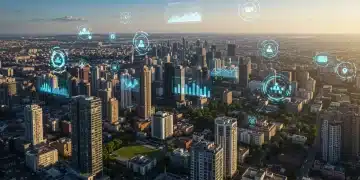Smart city solutions for sustainable living

Smart city solutions for sustainable living integrate advanced technologies like IoT and data analytics to enhance urban environments, improve resource management, and increase residents’ quality of life while addressing challenges such as privacy and financial constraints.
Smart city solutions for sustainable living are transforming urban environments into more efficient and eco-friendly spaces. Have you ever wondered how technology can lead to a better quality of life in cities? Let’s explore it together.
Understanding smart city solutions
Understanding smart city solutions is crucial for improving urban living. These solutions integrate technology with traditional city services to enhance the quality of life for its residents. As cities grow, leveraging technology becomes vital to manage resources efficiently.
What Are Smart City Solutions?
Smart city solutions refer to innovative strategies that utilize technology and data to address urban challenges. They aim to improve public services, enhance safety, and promote sustainability.
Key Components of Smart Cities
Smart city solutions typically include:
- IoT devices: Sensors and smart devices collect data on traffic, air quality, and energy usage.
- Data analytics: Large amounts of data are processed to provide insights for better decision-making.
- Mobile applications: Residents can interact with city services easily through apps.
- Smart infrastructure: Upgraded roads, bridges, and public transport systems enhance efficiency.
Implementing these components requires collaboration between governments, private sectors, and the community. It’s important to engage residents in the planning process. This ensures that smart city solutions meet the needs of their users effectively.
For instance, real-time data from public transport can reduce wait times and improve overall commuter experience. Similarly, energy-efficient buildings, equipped with smart technology, can lower costs and environmental impacts.
Benefits of Understanding Smart City Solutions
When citizens grasp the concept of smart cities, they become more active participants in the development of their environments. This understanding fosters:
- Community engagement: Informed citizens can voice their opinions and be part of decision-making.
- Increased safety: Knowledge of technology can lead to better crime prevention strategies.
- Environmental awareness: Understanding resource management results in more sustainable practices.
As we move forward, it’s essential to embrace these smart city solutions. The integration of technology into urban planning can truly revolutionize how we live. By collaborating and understanding these technologies, we can create safer, more efficient, and more sustainable cities for future generations.
Benefits of sustainable living in smart cities

The benefits of sustainable living in smart cities are significant and profound. By integrating sustainability into urban planning, cities can enhance the quality of life for residents while protecting the environment.
Improved Air Quality
One of the main advantages is improved air quality. Smart cities utilize technology to monitor pollution levels in real time. This data helps authorities implement measures to reduce emissions and promote cleaner transport options.
Efficient Resource Management
Sustainable living also leads to more efficient resource management. With smart grids and water management systems, cities can optimize energy and water usage. This not only saves costs but also helps to conserve precious resources.
- Energy-efficient buildings: Utilizing smart technology reduces energy waste.
- Water conservation: Advanced systems detect leaks and manage water usage.
- Waste reduction: Smart waste management solutions improve recycling rates.
Additionally, sustainable living encourages community engagement. Residents who participate in environmental initiatives feel a stronger sense of belonging. This can lead to greater cooperation among neighbors and city officials.
Moreover, smart cities that promote green spaces contribute to overall mental well-being. Access to parks and recreational areas improves public health and fosters social interaction.
Economic Benefits
Adopting sustainable practices can also create economic opportunities. Green technologies lead to job creation as new industries emerge. Residents benefit from easier access to local businesses that prioritize sustainability.
- Job opportunities: Green jobs in renewable energy and eco-friendly services are on the rise.
- Local economy boost: Supporting sustainable businesses contributes to community growth.
- Tourism: Smart cities can become tourist attractions for their innovative designs.
Investing in sustainable living within smart cities is an investment in the future. By prioritizing these principles, urban areas can thrive while maintaining environmental integrity, ensuring a livable city for generations to come.
Key technologies driving smart cities
Many key technologies driving smart cities are transforming urban areas into innovative and efficient spaces. These technologies help improve city services, enhance productivity, and promote sustainability, making life better for all residents.
Internet of Things (IoT)
The Internet of Things (IoT) is at the core of smart city solutions. By connecting devices, sensors, and systems, cities can collect valuable data. This data helps monitor everything from traffic patterns to energy consumption.
Big Data and Analytics
Big data analytics plays a crucial role in managing urban environments. It allows city planners to analyze vast amounts of information for better decision-making. Cities can predict future trends and respond effectively to challenges.
- Traffic management: Real-time data helps reduce congestion by optimizing traffic signals.
- Public safety: Analyzing data trends can help police allocate resources efficiently.
- Resource allocation: Data-driven insights assist in efficient management of resources.
Additionally, smart cities use advanced technologies to enhance the lives of their citizens. High-speed internet connectivity enhances communication and provides residents access to essential services. Public Wi-Fi networks in essential areas, like parks and community centers, can bridge the digital divide.
Smart Grid Technology
Smart grid technology is another vital component. It enables city utilities to manage energy more efficiently. Smart meters give consumers real-time data on their energy use, allowing them to make informed decisions about their consumption. This leads to lower energy costs and less waste.
- Renewable energy integration: Smart grids easily incorporate solar and wind energy.
- Demand response: Utilities can adjust energy supply based on real-time demand.
- Outage detection: Smart grids quickly identify and respond to outages, improving reliability.
Furthermore, the adoption of electric vehicles (EVs) is being supported by smart city technologies. Charging stations are strategically placed, making it easier for residents to switch to cleaner transportation. This shift plays a significant role in enhancing urban sustainability.
Artificial Intelligence (AI)
Artificial intelligence is also shaping the future of smart cities. AI algorithms can enhance services like traffic management, waste collection, and public safety. For instance, AI can analyze traffic data to optimize routes for public transportation, reducing delays and improving service reliability.
As cities embrace these key technologies, they pave the way for a more sustainable, efficient, and connected urban experience for everyone.
Challenges and considerations in implementation

Implementing smart city solutions comes with its own set of challenges and considerations. While the benefits are clear, addressing these challenges is vital for successful integration. Cities must carefully plan and adapt to new technologies.
Financial Constraints
One of the significant challenges is the cost of implementing these solutions. Upgrading infrastructure can require substantial investments. Cities often face budget limitations, making it tough to allocate resources effectively.
Data Privacy and Security
As cities gather more data, privacy concerns arise. Residents want to know how their information is used and protected. Ensuring data security is crucial for maintaining public trust.
- Regulatory compliance: Cities must adhere to laws governing data protection.
- Cybersecurity measures: Robust defenses are necessary to protect sensitive information.
- Transparency: Keeping the public informed about data usage fosters trust.
Additionally, citizens need to understand and appreciate the benefits of smart city technologies. Public engagement and education are essential. Without support from residents, implementation efforts may face resistance.
Interoperability Issues
Integrating various technologies can be challenging. Different systems must work together seamlessly for optimal performance. This requires careful planning and collaboration among technology providers.
- Standardization: Developing common standards can help different technologies communicate.
- Collaboration: City officials need to work with tech companies to ensure compatibility.
- Testing and evaluation: Continuous testing can identify and resolve interoperability problems early.
Moreover, cities must consider the environmental impact of new technologies. While promoting sustainability, it’s essential to ensure that implementing these solutions does not lead to new environmental issues.
Cultural and Social Acceptance
Cultural factors play a big role in how well smart city solutions are accepted. Different communities may have varying attitudes towards technology. Engaging with local populations can help tailor solutions to their needs and preferences.
Overall, addressing these challenges and considerations can pave the way for successful smart city initiatives. With careful planning and community involvement, cities can harness technology to create better living environments for all residents.
FAQ – Frequently Asked Questions about Smart City Solutions
What are the main benefits of smart city solutions?
Smart city solutions enhance quality of life, improve sustainability, and provide economic opportunities for residents.
What challenges do cities face in implementing smart technologies?
Cities often face financial constraints, data privacy concerns, and the need for community engagement when implementing smart technologies.
How can community engagement influence smart city projects?
Involving residents in the planning process ensures that smart city solutions meet their needs and fosters public support for initiatives.
What role does technology play in improving public safety in smart cities?
Technologies like IoT and big data analytics help monitor trends and allocate resources effectively, enhancing public safety and response times.





